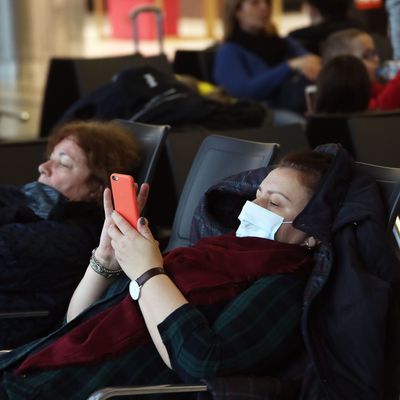
The spread of the sickness that we know as coronavirus, or COVID-19, is worrying for a host of reasons. It’s easily transmittable and 20 times more lethal than the flu, but on top of the virus itself, its rapid spread has revealed the limits of the ability of governments and state institutions to deal with pandemic scenarios. The White House is scrambling, the markets are in free fall, and you’re not even allowed to touch your own face.
But here’s an upside: what if this is good for memes? I’m not talking about memes and internet jokes about the virus itself, though it has provided a wellspring of material there as well: YouTubers pretending to have the virus; thousands upon thousands of web-native nihilistic posts along the lines of “I can’t wait for the virus to kill me” litter social media, in the same performative, pessimistic way that people talk about climate change or asteroids that might send us the way of the dinosaurs. Dark subjects make for potent meme material in that hazy area between sincere and ironic.
But what I’m referring to is not coronavirus memes themselves, but the environment in which all memes are made. Creativity thrives on constraints, and Coronavirus is, theoretically, the ultimate constraint. Traveling to certain countries now gets Americans a nice two-week staycation in which they need to isolate themselves. Chinese users under quarantine have dealt with the isolation by posting online. Those types of conditions — extreme boredom and emotional distress — often breed memes. If we imagine a worst-case global pandemic in which most of the internet’s users are trapped in isolation in their homes and only have the internet as a way of connecting to others, then it’s not difficult to see these constraints as, also, the optimal conditions for meme incubation. Bored people posting more frequently and at an increasing pace, iterating on each other’s ideas and creating obscure jokes and formats with only the basic environments and resources of their homes.
The coronavirus-driven isolation will supply society with even more of what media theorist Clay Shirky calls “cognitive surplus,” using our free time and brain-power for productive activities (like meme participation) instead of simply consumptive ones (like watching TV). The increasing speed and capability of technology has made it much easier to participate in meme culture than a decade ago, but now imagine if you also didn’t have to occupy your mind with concerns about work, or IRL social interaction, or getting dressed in the morning, or basic hygiene. All of that cognitive surplus now goes toward finding dumb stuff to post on the internet, an exponentially increasing growth curve of media generation.
When Vine debuted in 2013, its six-second video limit felt claustrophobic, but very quickly, bored teens and aspiring comedians figured out how to make some of the densest works of video art in the history of the medium, packed with jokes, deft editing, and creatively improvised visual effects. Popular comedy videos are often just people talking to their front-facing camera now, or have one person playing multiple parts, and fashioning props from whatever is lying around. The audience for viral media often rewards those who work within tight constraints, whether those are related to time or resources or form.
Internet memes are a formula that every user plugs their own values into. They all feature the same image, or GIF, or syntactic equation. Image macros from a decade ago swapped the images applied to common images, trending algorithms reward users who talk about what everyone else is talking about, and more recently, TikTok’s heavy emphasis on remix allows common sound bites and dance moves into memes. Every meme offers wide creative latitude, but also has requisites. To post a meme is to be in on the joke, and for a populace that maybe is no longer allowed to touch each other, or be in the same room as each other, these shorthands hold an obvious appeal.
So yeah, maybe the coronavirus is gonna kill you, but if that’s the case, at least you’ll die laughing.





























